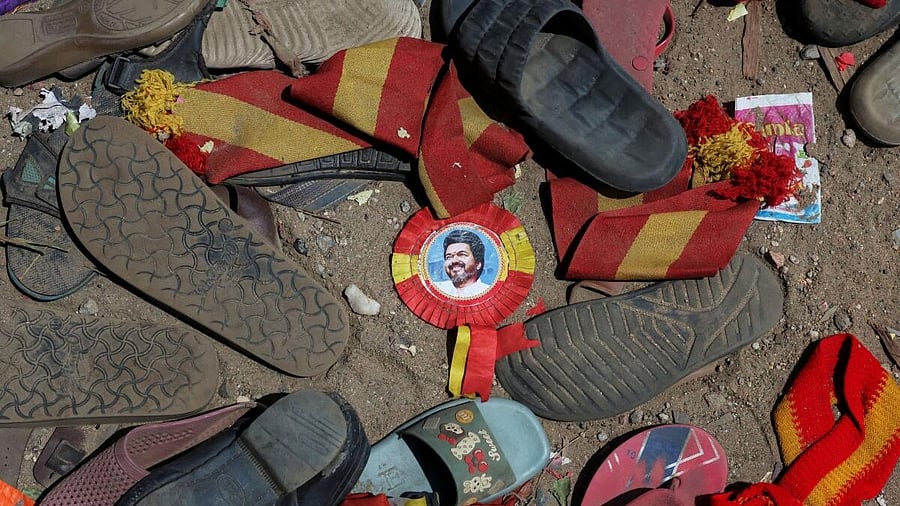
A badge with picture of Vijay, actor and politician, lies amid footwears and other belongings left by attendees at the site of a stampede indicent during an election campaign rally held by Tamilaga Vettri Kazhagam party, in Karur district of Tamil Nadu.
Credit: Reuters Photo
The killer stampede at actor-politician Vijay’s rally in Karur, on Saturday, is one of the worst political tragedies of recent times. Forty one people, including women and children, have died. This was not fate, not an unforeseeable accident, but a man-made disaster caused by negligence, vanity, and the reckless conflation of cinema glamour with political ambition. The grief is immeasurable, but what makes it especially unbearable is the sheer absence of responsibility and accountability.
The writing was on the wall well before Karur. Vijay’s two earlier rallies had witnessed chaotic, unmanageable crowds; yet, the risky pattern was repeated with no corrective action. Supporters arrived early in the morning, camping without water or food, and by noon, the venue was packed, and crowd control was clearly inadequate. Tamilaga Vettri Kazhagam (TVK), Vijay’s fledgling party, has been exposed for its lack of preparedness most tragically and predictably. Politics is not cinema; it demands structure, foresight, and discipline, not stardom and spontaneity. To host a rally without protocols, emergency plans, or medical support is not oversight but reckless negligence, which has proven fatal.
Vijay’s late arrival only worsened matters, turning restlessness into a dangerous surge as fans pressed forward for a glimpse of the star-turned-politician. When tragedy struck and bodies of men, women, and children lay lifeless, he left Karur for Chennai without meeting grieving families, issuing a flat statement of condolence nearly four hours later. For a man who commands such emotional devotion, his detachment was telling. In politics, presence matters more than words, and accountability more than money. His offer of Rs 20 lakh per family may calm anger briefly, but money is neither justice nor repentance. Worse still was his claim that the tragedy was “beyond his imagination”. India has witnessed countless stampedes at political and religious gatherings; to feign surprise is dishonest and an insult to public memory.
The Karur tragedy is more than failed crowd control; it exposes the deeper culture of cinema-driven politics in Tamil Nadu. Vijay still behaves like a film star, seeking applause instead of shouldering responsibility. His unruly, idol-struck fans reveal the dangers of celebrity politics, where mass frenzy replaces civic discipline. A true leader must not just draw crowds but also manage and protect them. By that measure, Vijay remains half an actor, not yet a leader.
Crowds are not achievements, nor does turnout guarantee political success. When leaders equate rally size with strength, treating gatherings like weekend box-office releases, they invite the very disasters we saw in Karur. Vijay’s choreographed mega-meetings drew more from a movie-release script than a political playbook, and the pursuit of spectacle has turned deadly.
State can’t evade responsibility
The Tamil Nadu government, too, cannot quietly step aside as if this were simply a party affair gone wrong. Chief Minister M K Stalin’s swift visit to Karur was commendable, and relief measures were quickly announced. However, the larger question remains: why was such an ill-prepared gathering permitted in the first place? Where were the adequate barricades, the preventive police presence, the safety regulations that any responsible administration ought to enforce? The state cannot wash its hands of responsibility in tragedies like these by waving the cheque book. Preventive governance failed, just as Vijay’s party failed. Both stand guilty
of negligence.
The Karur disaster is an indictment of an emerging political career that has failed its very first test of leadership. Lives that gather in your name are lives entrusted to your care. Vijay has enjoyed the applause of millions on screen, but applause in politics without accountability is no achievement at all. He chose the stage of politics; he cannot now behave like a performer walking off after a show gone wrong, leaving others to pick up the bodies.
And what of the public? Families who bring children to impossibly overcrowded rallies and fans who suspend common sense in their devotion to celebrities must also reflect. The culture of blind adulation for film stars has reached a dangerous limit when it overrides even self-preservation.
Whether Karur becomes a turning point or merely another page in India’s long list of forgotten tragedies depends on what happens next. The lives lost cannot be reduced to compensation tables and enquiry reports that gather dust. Accountability must be fixed – on the party that failed to manage its own crowds, the state that failed to monitor public safety,
and the star whose political ambitions have already left coffins in their wake. Politics cannot be built on the corpses of the faithful.
(The writer is an educator and political analyst based in Bengaluru)
Disclaimer: The views expressed above are the author's own. They do not necessarily reflect the views of DH.